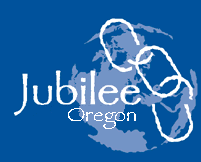One of the most challenging issues facing the Jubilee global movement is the call for 100% cancellation of the debt without “harmful conditions.” These harmful conditions are the Structural Adjustment Programs of the IMF that debtor nations are required to adopt in their domestic economies BEFORE they can qualify for any form of debt relief. The topic of conditionality was on the agenda of one of the Debt workshops with South and North speakers.
Alejandro Bendana, a Nicaraguan founder of Jubilee 2000 in
Alejandro challenged Jubilee movements in the North to not buy into the anti-corruption arguments but instead to support the ethical principle that all nations have the sovereign right to determine their own political and economic futures. If the people of
As a panel member and a Jubilee USA campaigner, I said that I have encountered people who decry the corruption in African and Latin American nations and believe that it is only realistic to require anti-corruption measures. In a recent conference in
After the workshop I reflected on the Leviticus passage as well as the Lord’s Prayer. Both parts of the Bible talk about Cancellation or Forgiveness of Debts. Debts are to be forgiven every seven years, the Sabbath year, but there is no mention that debts are only to be cancelled if the debtor proves how he will spend the money. In the Lord’s Prayer Jesus prays, “Forgive us our debts as we forgive our debtors.” The biblical vision is for “unconditional debt cancellation.” Are we able to live out this visionn?

No comments:
Post a Comment